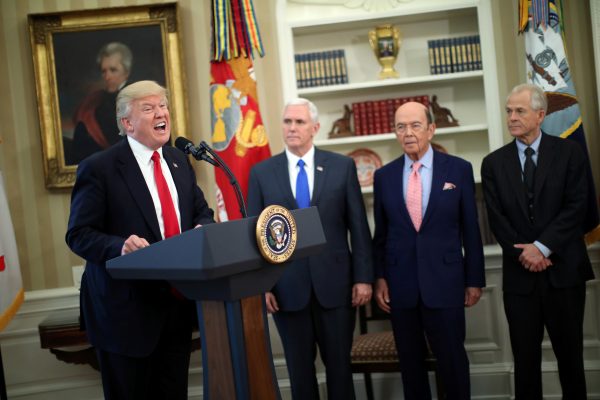Within the first 100 days of the Trump administration, reality has overwhelmed a good deal of campaign rhetoric, and individuals experienced and skilled in conventional public management have prevailed over some who epitomised revolt against elites. But ideas that challenge longstanding US positions on the world economy and international integration remain at the core of the Trump administration.
Bilateral trade balances have long been known to be an inappropriate policy objective. Yet the Trump administration is pursuing this without any sound argument. Its belief is that only bilaterally balanced trade (or an excess of US exports) is ‘fair trade’. This nonsense is reinforced by concentrating on trade in goods, ignoring surpluses on services trade. And the capital account is ignored entirely.
Trump expands the idea of bilateral balance to the trading relationship with every other country. He insists on what Gary Hufbauer has called ‘mirror-image reciprocity’. Every component of a deal, every individual tariff rate, any provision about rules of origin for specific products, and any condition for foreign investment must be no less favourable for US exporters than the corresponding rule applied to the United States. This is misplaced concreteness has gone mad.
The idea of a win-win overall deal is rejected. The very idea of complementarities between economies is ignored. That this is endorsed by the chair of the newly established National Trade Council Peter Navarro, who holds a Harvard PhD in economics, is a conclusive argument for an enquiry into Harvard standards.
Two of Trump’s executive orders on trade deficits and trade laws would both fail the most elementary of economics examinations.
Under the Trump administration, history is no more respected than economics. It has been argued that the WTO and its predecessor GATT were intended to apply only to developed economies. Those who were at the Havana conference in the 1940s and those who negotiated with developing economies in the Uruguay Round saw no such belief among their US colleagues.
This is a thin disguise for wishing to continue using subterfuge rather than economic logic in consideration of so-called ‘countervailing duties’ and ‘anti-dumping penalties’ against China. The idea that there is an indisputable definition of a ‘market economy’ is absurd, but then so is the underlying idea of dumping. Artificial lowering of prices with the intention of raising them after forcing a competitor out of business should be countered — if it were ever properly detected.
Even more absurd is the notion that ‘over capacity’ is something that requires government intervention. Consumers gain from cheap products. When producers cannot sustain output levels at such low prices, the appropriate response is for the least efficient producers to exit. In the case of steel, ‘least efficient’ is probably not the same as ‘Chinese’.
Most concerning is an attack on the WTO dispute resolution system. US opposition to it predated the Trump administration. The Obama administration vetoed the reappointment of a judge to the Appellate Body for the little-disguised reason that his decisions were uncongenial.
US resistance to the dispute resolution system has never been far from the surface. It is often rationalised by a constitutional principle that only the US Congress can create laws which bind US citizens. Some US judges can nevertheless make positive use of international reasoning, and previous administrations have recognised that membership of international institutions could require them to persuade Congress to amend US law or to compensate a foreign party.
The language in the final statement of the WTO dispute resolution system is in no way an exemption of the United States from the dispute resolution system. The words of the dispute settlement understanding that a ruling can’t ‘add to or diminish the rights or obligations’ of a member country — relate to member countries’ commitments, not US law, and their interpretation is not a US prerogative.
Rhetoric about a ‘rules-based international order’ or the ‘modern liberal international order’ is now entirely empty when set beside the declared intentions of the Trump administration. Again, the problem is deeper than Trump. No country can be an effective advocate of the rule of law when its partisan politics dominates the choice of its most senior judges. Fundamentally, the United States has to adjust to no longer being able to dominate global affairs.
Economic integration now has to be led by countries other than the United States. But successful integration elsewhere will cause responses within the United States as businesses miss profitable opportunities and as voters see that they are missing out on consumption and employment gains.
Gary Hawke is retired Head of the School of Government and Professor of Economic History, Victoria University of Wellington.


‘Mirror image reciprocity’ is also a psychological concept. It describes someone who believes he/she MUST receive positive feedback from others in any and every interaction that they have.
It is to be expected in very young children. They need constant support in order to develop a positive and effective sense of themselves in the world. And they also lack resources to deal with frustration, which is part of life, very effectively.
But it is problematic,to say the least, when an adult expects to receive this kind of adulation. When it fails to come their way (as it surely must), they react with angry blaming of others while never recognizing that perhaps their own expectations are unrealistic.